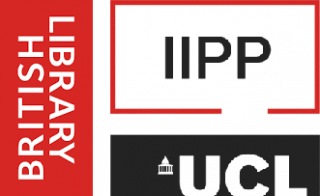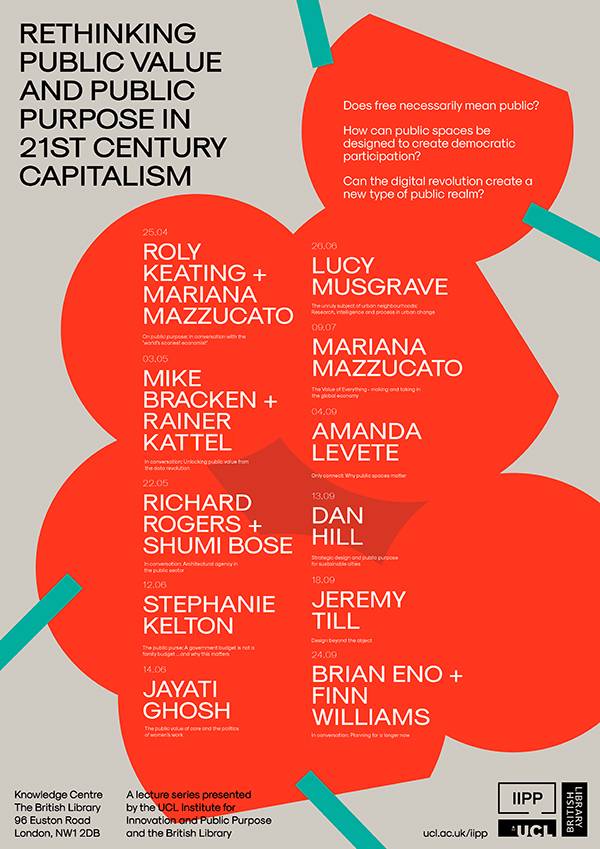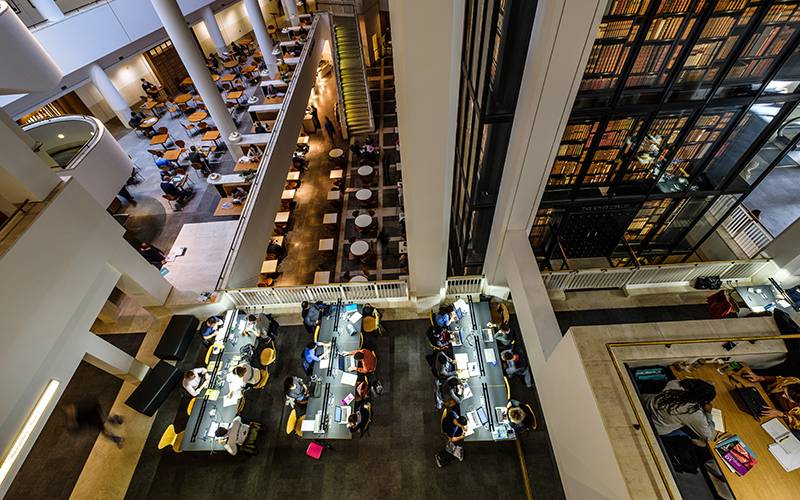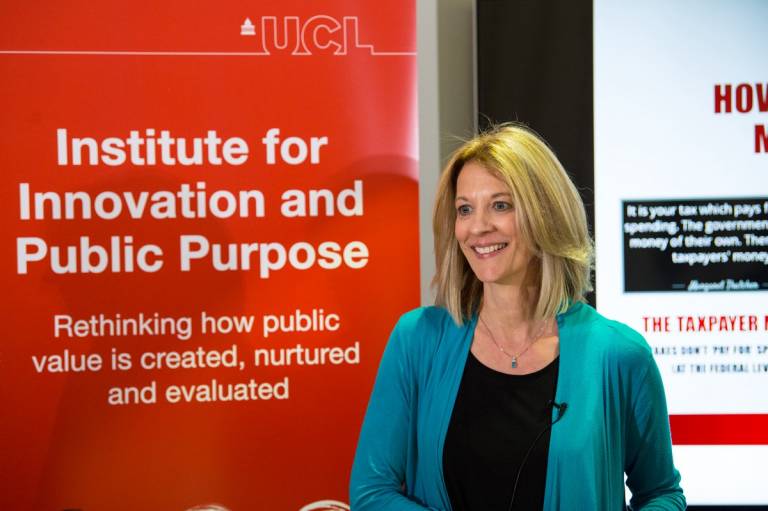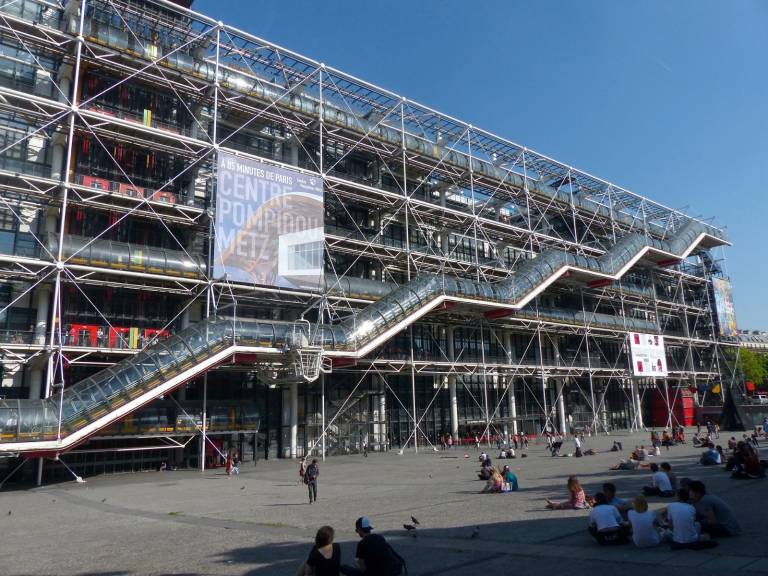IIPP and British Library partner to deliver cutting-edge lecture series on public value
18 September 2018–24 September 2018, 6:30 pm–8:00 pm

Rethinking Public Value and Public Purpose in 21st-Century Capitalism is a public lecture series presented by IIPP in collaboration with the British Library.
Event Information
Open to
- All
Availability
- Sold out
Cost
- £0.00
Organiser
-
British Library
Location
-
Knowledge CentreThe British Library96 Euston RoadLondonNW1 2DBUnited Kingdom
Featuring luminaries from the worlds of arts, economics, architecture and design and policymaking, it considers the role of the public sector in today’s capitalist world and asks what partnerships are needed to address societal and technological challenges? How can public spaces be designed to create more democratic participation and new forms of learning and exploration? Does public necessarily mean free? Can the digital revolution create a new type of public realm?
The series features thought-leading speakers including leading architects and planners (Richard Rogers, Amanda Levete, Lucy Musgrave, Dan Hill, Finn Williams), digital strategists, artists and designers (Jeremy Till, Brian Eno, Mike Bracken), economists and social scientists (Stephanie Kelton, Jayati Ghosh, Dan Sarewitz, Rainer Kattel).
In conversation with the 'world's scariest economist'
On public purpose: Roly Keating in conversation with Mariana Mazzucato, the ‘world’s scariest economist’
Wed 25 Apr 2018, 18:30 - 20:00
On the first night of the Rethinking Public Value series, IIPP Director Professor Mariana Mazzucato, styled by The Times as the ‘world’s scariest economist’ will be joined by Roly Keating, Chief Executive of the British Library, to explore the provocative issues that the series aims to address. Roly will draw on his extensive background steering national institutions in the pursuit of public purpose and value, with the British Library, the BBC, and beyond.
Watch the first event via YouTube below, including introductions to the series from Roly and Mariana.
Unlocking public value from the data revolution
IIPP's Mike Bracken and Rainer Kattel discuss government digital transformations
Thu 3 May 2018, 18:30 - 20:00
How can governments unlock public value from digital transformation and harness the potential encapsulated in the internet and data for more equitable public services?
Mike Bracken, founder of the UK's award winning Government Digital Service (and its digital platform gov.uk) and Rainer Kattel, UCL Professor of Innovation and Public Governance, discuss the experiences of government digital transformation from around the world, specifically focusing on the UK and Estonia as paradigmatically diverging examples.
This lecture will explore how governments can unlock public value from digital transformation and harness the potential encapsulated in the internet and data for more equitable public services. How much and what kind of data should citizens own, and should we be able to earn from our data owned by private corporations?
Architectural agency in the public sector
Tuesday 22 May 2018, 18:30 - 20:00
The romance of public service, once thriving in the UK, has been absorbed into market dynamics. Important civic and social assets are now extensions of the privatised realm, to which the public is granted conditional access.
How can architectural intelligence be better deployed in the public sector?
Can we rebuild connections between architectural and urban practice and the state?
In conversation with architectural historian and curator Shumi Bose, Lord Richard Rogers will share his reflections on architectural agency in the public service today. Rogers has proven to be an anomaly when compared to the waning relationship between architectural practice and government policy. No stranger to Whitehall, he frequently and conspicuously comments on public policy, particularly regarding housing and homelessness. Rogers’ Urban Task Force of the late nineties published Towards an Urban Renaissance, which has guided urban regeneration in the UK ever since.
The public purse: a government budget is not a family budget …and why this matters
Stephanie Kelton on the relationship between budgeting and the economy
Tuesday 12 June 2018, 18:30 - 20:00
Drawing on her experience as the Chief Economist on the U.S. Senate Budget Committee, Stephanie Kelton will give a beginner’s class on public deficits and what (almost) everyone is missing in the debate over the government’s budget. Is the government’s budget really just like a family budget? (Teaser: It’s not!) What is the purpose of budgeting anyway? Is it to balance spending and revenue, or is targeting a balanced budget the wrong goal altogether? Is the British government living beyond its means?
Stephanie will outline a new way of understanding deficits, debt, taxes, the relationship between the public and private sectors, and what our economy could look like. Turning the public budget into a participatory, mission-oriented endeavor Is critical to restructuring public services and public investment and building the kind of economy that will deliver a cleaner, safer, more secure future for all.
Stephanie Kelton, Ph.D. is Professor of Economics at the University of Missouri-Kansas City. She served as Chief Economist on the U.S. Senate Budget Committee (minority staff) in 2015 and then became an Economic Advisor to the Bernie 2016 presidential campaign.
The public value of care and the politics of women’s work
Jayati Ghosh on the importance of recognising, rewarding, reducing and redistributing care work - and ensuring representation for care workers.
Thu 14 June 2018, 18:30 - 20:00
Care services are taken for granted, unrecognised and unsung in almost all societies. But they contribute hugely to public value: to social well-being, cohesion and stability and to the progress of the economy and its future potential – even though that contribution is missing in the national accounts.
Currently, most care work is performed by unpaid and underpaid women, especially in developing societies, which unfortunately affects social attitudes to all work done by women as well as all care work. This needs to change to create happier and more equal societies. Public policy is crucial in determining the extent, coverage and quality of care services as well as the conditions of care workers.
Jayati Ghosh is Professor of Economics at the Centre for Economic Studies and Planning, School of Social Sciences, Jawaharlal Nehru University, New Delhi.
The unruly subject of urban neighbourhoods: research, intelligence and process in urban change
Lucy Musgrave on the interlinking of spatial, social and cultural conditions within the urban fabric.
Tuesday 26 June 2018, 18:30 - 20:00
How can we nurture and forge a strong, legitimate and significant civic identity for 21st century neighbourhoods and cities?
Through examples of international and UK civic projects, Lucy Musgrave will show a new field of practice in urbanism that has emerged to forensically study urban conditions and needs in order to propose change that is inclusive, rich in meaning, forward-thinking and human-centred.
This radical approach refuses to shy away from the inherent ‘messiness’ of urban neighbourhoods and their existing social networks, so easily swept away in the rapid churn of new development. Instead, it employs a new way of looking at and acting in the city; a process of analysing the complexity of what exists in urban neighbourhoods; bold, strategic thinking about urban change; and communicating new ways for neighbourhoods to thrive.
Lucy will show how spatial, cultural, social and economic conditions can be used to design inspiring, ambitious and tangible strategies for the future, and why it is in the interest of the private sector to adopt a strategic approach to city development that focuses on the value of long-term stewardship. Finally, she will demonstrate the power of using evidence-based briefs to forge partnerships between politicians, policymakers, investors and users, build civic identity and catalyse urban change that addresses real need.
The Value of Everything - making and taking in the global economy
Mariana Mazzucato speaks on new book about the concept of value.
Monday 9 July 2018, 18:30 - 20:00
Who really creates wealth in our world? And how do we decide the value of what they do? At the heart of today's financial and economic crisis is a problem hiding in plain sight.
In modern capitalism, value-extraction is rewarded more highly than value-creation: the productive process that drives a healthy economy and society. From companies driven solely to maximize shareholder value to astronomically high prices of medicines justified through big pharma's 'value pricing', we misidentify taking with making, and have lost sight of what value really means. Once a central plank of economic thought, this concept of value - what it is, why it matters to us - is simply no longer discussed.
Only connect: why public spaces matter
Amanda Levete on the purpose and value of public space
Tuesday 4 September 2018, 18:30 - 20:00
What makes good public space? And, as architects, how can we design public spaces that allow these exchanges to happen?
What is the role of our institutions in the creation of public space? Can they be risk takers in a risk-averse world? And how can we persuade them of the nobility of pushing limits and advancing the debate?
Public spaces create countless opportunities to connect across thresholds: connecting people of different nationalities and from different walks of life. When you connect people, relationships are formed and thresholds become more about mutual exchange.
Exploring these ideas through two AL_A projects – the V&A Exhibition Road Quarter in London and MAAT in Lisbon – Amanda Levete will examine the purpose and value of public spaces and the impact they can have on public organisations.
Cities, and the battle for the infrastructure of everyday life
Dan Hill considers how the future of our cities will be shaped by advancing technologies.
Thursday 13th September 2018, 18:30 - 20:00
Our cities are paused in front of several different alternative futures. One we might describe as ‘business as usual’, which is actually a slow, unthinking drift from 20th century systems into those of shaped by 21st century ‘big tech', in which we are unprepared, ill-advised and increasingly subjugated by individualising technologies applied at urban scale. The other city we might describe as full of the possibilities of similar-looking but actually quite different 'networked urbanism', engaged with consciously, deliberately and working with the dynamics of contemporary systems for civic and public outcomes.
It implies quite a different form of city-making, enabled by a convergence of contemporary approaches such as building fabrication, robotics for maintenance and construction, autonomous mobility and logistics systems, shared super-local energy systems, advanced manufacturing and AI, super-green safe streets and truly shared living spaces, all calibrated by carefully redesigned decision-making cultures.
This is where the real invention is required, the true design agenda:
How do we re-appropriate these technologies in a way that reinforces the idea of the city as a public good, not a mere collision of private ones? This richly illustrated talk will describe a diverse array of projects, techniques and approaches from projects and practices all over the world.
Dan Hill is a Visiting Professor at IIPP, as well as an Associate Director at Arup, and Head of Arup Digital Studio, a multidisciplinary design team based in London.
Design beyond the object
Jeremy Till explores the social implications of design
Tuesday 18 September 2018, 18:30 - 20:00
Design is traditionally associated with the production of material objects, and designers identified through the association with their objects – the Eames chair, the Hadid building, the Heatherwick bus. This object-centred approach to design brings with it a number of tendencies. First, design is deployed as an agent of desire and so becomes part of a system of consumption and commodification. Second the objects of design are evaluated against a limited set of criteria – utility, robustness and aesthetics (or rather the age old Vitruvian triad of commodity, firmness and delight). Third, these objects become isolated from their social and environmental context.
This lecture will critically explore these tendencies and move to a position that sees design beyond just the object, looking to the constitution and consequences of design as part of a broader public field. By addressing the immaterial as well as the material, the lecture will argue for an understanding of design as part of a socially-constituted network which acts in favour of the common good, rather than in service to individual desire.
Planning for a Longer Now
Brian Eno and Finn Williams ask how the public sector might find a new agency to create long-term public value.
Monday 24 September 2018, 18:30 - 20:00
How can we create real and lasting public value within an increasingly narrow and short-sighted ‘here and now’? 24 hour news cycles are leaving politicians struggling to look past tomorrow’s headlines, let alone think beyond electoral terms. National leaders are conceiving policies in reaction to their twitter feeds. The most globalised countries are turning their backs on the world to look in on themselves. So who is really doing politics now? And where are new ideas for the future of cities and society coming from?
The state was once in the business of building futures, but over a period of decades it ceded the initiative to the private sector. The public sector’s delivery capacity has been broken down into contracts, its appetite for risk outsourced, and its skills and knowledge salami-sliced by efficiency cuts. Now the short-term savings of handing over to companies like Carillion or Capita are starting to add up to long-term costs – not just financially, but also socially, and democratically. Who is left to plan beyond the dates the contracts end?
Can bureaucracies be creative? What role should science have in government today? Who are the civil servants of the 21st century? How do you define government when the lines between public, private and civic society are increasingly blurred? Can we imagine a 'civilian politics'? How could governments and citizens collaborate to plan for a bigger here, and longer now?
Finn Williams is a Visiting Professor at IIPP, and the co-founder and chief executive officer of Public Practice, a social enterprise building a new generation of planners to shape places for the public good.
 Close
Close


